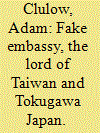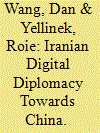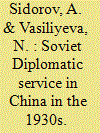| Srl | Item |
| 1 |
ID:
095356


|
|
|
|
|
| Publication |
2010.
|
| Summary/Abstract |
In 1624, the Dutch East India Company established a colony on Taiwan. When Dutch authorities moved to tax and restrict Japanese traders, who had been sailing to the island for a number of years, they encountered immediate resistance spearheaded by Suetsugu Heiz?, a Nagasaki official and merchant heavily invested in the Taiwan route. As part of his struggle against the Dutch, Heiz? attempted to drag the Japanese state into the conflict by engineering a fake embassy formed of 16 aboriginal men recruited from a village in Taiwan and transported to the center of Tokugawa power in Edo. This paper explores the embassy and uses it to consider why powerful Asian states like Tokugawa Japan displayed so little interest in overseas expansion, creating a vacuum of power that European overseas enterprises rushed enthusiastically to fill.
|
|
|
|
|
|
|
|
|
|
|
|
|
|
|
|
| 2 |
ID:
184393


|
|
|
|
|
| Summary/Abstract |
Digital diplomacy is an efficient tool for building close relationships between countries, especially when it comes to people-to-people diplomacy (P2P). This article aims to explore how the Iranian embassy in Beijing uses Chinese social media and reveals the motivations and changes in its behaviour. The main finding was that 2019 was a turning point; before 2019, the embassy messages were more informative without targeting specifically its Chinese audience, and since 2019 the messages have been showing deeper understating the local discourse and, therefore, have been more tailored for its Chinese audience. The main reasons for that were the place of Iran in the China-US trade war, the role of the EU in uplifting Iran's status in the international community, and the Ambassadors' characteristics and background, which switched at the end of 2018.
|
|
|
|
|
|
|
|
|
|
|
|
|
|
|
|
| 3 |
ID:
188510


|
|
|
|
|
| Summary/Abstract |
AS THE WORLD was moving toward World War II, Soviet leaders and the People's Commissariat for Foreign Affairs (NKID) were paying as much attention to China as to the situation in Europe. By the early 1930s, Moscow no longer had diplomatic relations with China (they had been severed by the Chiang Kai-shek government in 1927, when the Kuomintang dissolved the [first] united front with the Communist Party of China). In 1929, in the wake of armed conflict over the Chinese Eastern Railway (CER), the Soviet Union closed its consulates in Manchuria (they reopened in 1930 after the Khabarovsk Protocol was signed that ended the conflict). Soviet consulates continued functioning in Xinjiang, which at that time was not controlled by the central Chinese government. A Soviet Embassy and five consulates functioned in the Mongolian People's Republic, which Moscow treated as an independent state while formally recognizing Chinese sovereignty over it.
|
|
|
|
|
|
|
|
|
|
|
|
|
|
|
|
| 4 |
ID:
141726


|
|
|
|
|
| Summary/Abstract |
This article shows that the simultaneous management of three different social roles – knowledge producer, representative of a government, and bureaucrat – defines the everyday work and practice of contemporary diplomats posted at embassies. This argument rests on an analysis of information gathering in Western embassies before, during and after the eighteen days of the revolt that ousted Egyptian President Hosni Mubarak in 2011. I first identify various practices influencing diplomatic knowledge and prompting the production of particular interpretations of the revolt in Egypt. I then analyze how actors manage multiple positions and dispositions within overlapping social fields. This point illustrates what practice theorists mean when they assert that agents are always speaking from a position. Overall, the article unravels what being a diplomat posted abroad actually consists of in practice, complementing existing studies on the diplomatic mode of knowledge production. I provide insights on the interactions between diplomats and non-state actors and show that diplomats’ social skills and analytic competence constantly require and support each other.
|
|
|
|
|
|
|
|
|
|
|
|
|
|
|
|